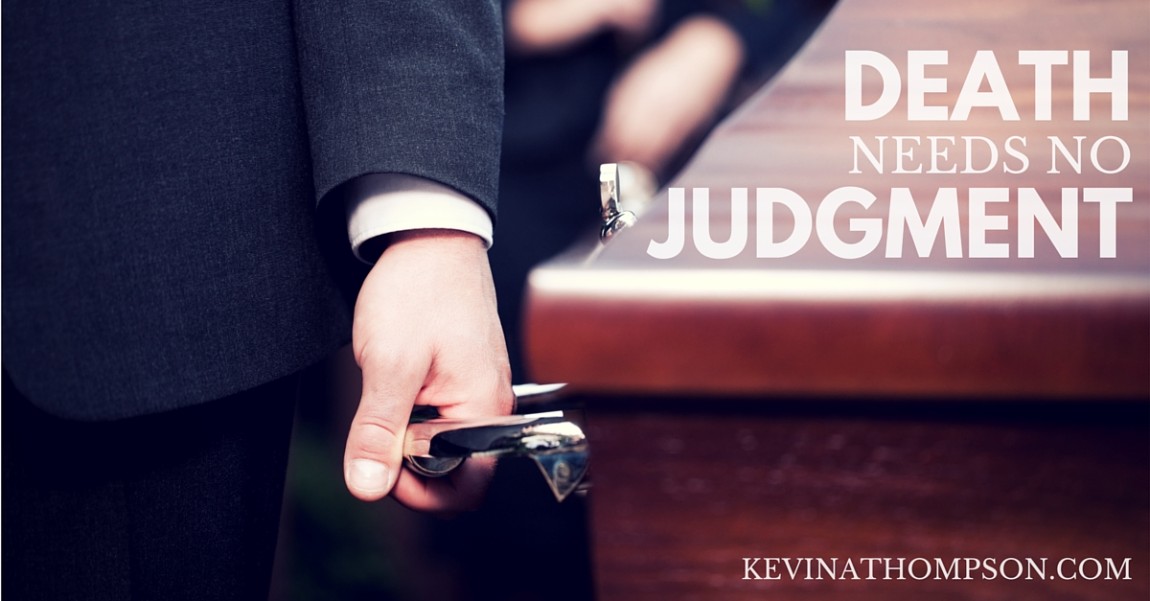It’s a dark side of humanity. Our intentions aren’t evil. The habit is likely born of fear. Living in the midst of inexplicable tragedy is frightening so we try to put cause and effect to every scenario.
The result is humanity’s ugly habit of judging death.
I’ve officiated the funerals of many people who have died of lung cancer. In almost every situation someone will ask, “Did they smoke?”
When an accidental death occurs, the conversation eventually turns to the questions, “What were they doing on that road at night?” or “Didn’t they understand the forecast?”
I can’t even list some of the things said after a suicide.
While families grieve, friends mourn, and communities try to come to terms with the loss of a person, bystanders tend to judge the person who has died. (To see how this article applies beyond death, READ THIS)
The temptation is understandable. If a clear link of cause and effect is determined between a person’s actions and their demise, we can learn what actions to avoid. The habit is an attempt to control life, avoid death, and alleviate some of the mystery of this world.
Sadly, however, it doesn’t work. Death isn’t easily explained. Life is fully of mystery. And as much as we would love to control what happens to us, we do not have nearly the control we desire.
Yet we continue to judge. While those judgments do not provide the outcomes we desire, they do cause very predictable results. Our judgments in no way help us but in every way add sorrow to an already grief-stricken situation. (See: An Ever Changing Grief)
Every death is sad. The sadness may differ. Losing a child whose life has just begun does not compare to the death of a 90-year-old at the end of a good life, but both are losses. Both create grief. Both remind us of the frailty of life.
When a family or community loses a loved one, they need support. Nothing can take away their pain, but love can assist them through their pain. And love can prevent us from doing things which cause more pain.
Judging someone by how they die multiplies the family’s pain.
This isn’t meant to minimize human responsibility or downplay the importance of making good decisions. While we do not have total control over our lives, our decisions can influence life and death. Jenny has a tendency of stepping over barriers to get a better photograph. I often reminder her, “I do not want to raise these children by myself.” As a golfer, it’s not uncommon for playing partners to say we should ignore the radar in order to finish the round. While I want to keep playing, I don’t want to take unnecessary risks with my life because I know my wife, kids, and community depend on me. Our decisions do matter and we should take them seriously. (See: 7 Recommended Books for When Life Hurts)
However, there is no benefit in forming opinions about how other people die. Whatever the circumstances of their death, our only responsibility is to grieve and love.
We shouldn’t judge because we never know the full story. There is always more to someone’s story. Even if we know the circumstances of the moment, we don’t know a person’s history or motives. Judging assumes we know everything necessary to fully understand a situation. We never know the whole story.
We shouldn’t judge because we all make bad choices. There have been several occasions in my life where I could have died because I made bad choices. On multiple occasions I have failed to pay proper attention while driving, but for whatever reason I didn’t pay the ultimate price for my failure. Whenever I judge, I’m failing to remember my past bad choices.
We shouldn’t judge because it’s not our business. Who cares what our opinion is about someone else? It is pointless. It is not necessary for us to have an opinion about every person or situation. Instead of making judgments about people, we need to work harder to love them.
Death is a scary part of life. While we can influence it, we can’t control it. We must recognize our desire to judge others is a sign of our own fear, not a necessary element to make life better. Recognize the fear, refuse to make the judgment, and love other people.




3 Responses to Death Needs No Judgment